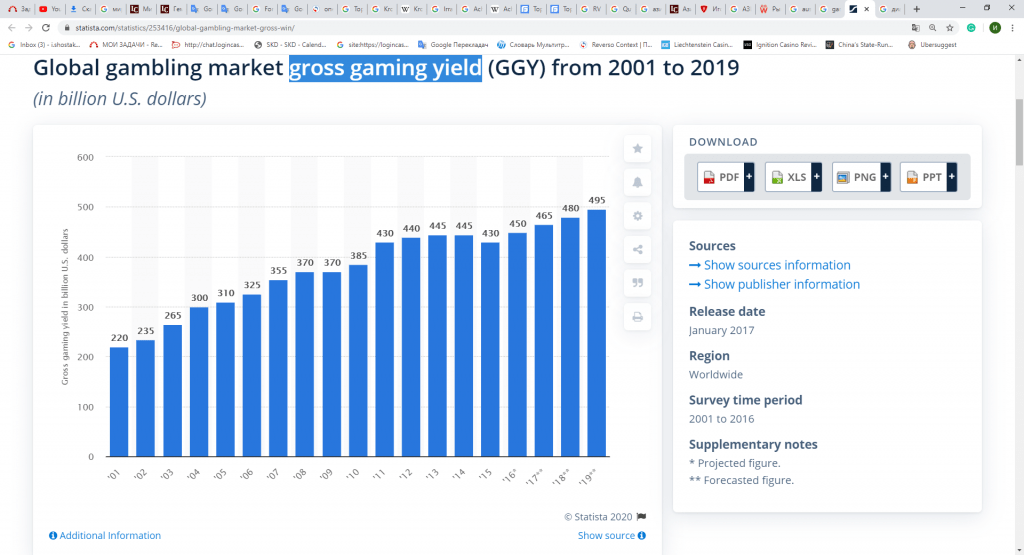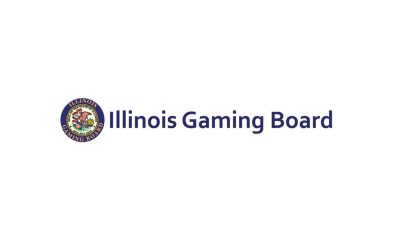Asia
Asia-Pacific Region: Detailed Overview of the Fastest-Growing Gambling Market of the World

The gambling industry is one of the most flexible sectors of the modern world economy. This industry not only demonstrates the growth and high rates of return on investment but also introduces unique innovative trends that are in many ways ahead of even the most positive experts’ assumptions.
Online gambling business magazine Login Casino has prepared an overview of the fastest-growing market of the world in the gambling industry and the reasons for its quick development, as well as future forecasts.
The following diagram shows data on the amount of money received by gambling operators in the world from 2001 to 2019.
According to experts’ predictions, the world gambling market will continue to evolve. Modern technologies contribute to the improvement of gambling services, which makes this activity even more attractive and accessible to users. The growth of the market is facilitated by the use of mobile phones, which entails the emergence of programs and applications for phones; improvement of the level of welfare, which allows people to spend more money gambling; as well as expenditure of the Internet coverage.
Fastest-growing market overview
According to the experts’ reports, at present, the fastest-growing market in the world is the Asia-Pacific region. In general, the Asian-Pacific market has a tendency to increase gambling revenues, as well as the spread of legalization. Nowadays, countries with legalized gambling make huge profits, and in states where gambling is illegal, offshore casinos are very popular. Below, we will take a closer look at the major countries in the gambling market of the Asia-Pacific region.
China
In general, gambling in China is illegal. Residents of the country can try only one gambling activity, the operator of which is the state itself – the lottery. As for other activities, involving betting, they are held in two gambling zones – Hong Kong and Macau.
In Hong Kong, it is possible to try four types of gambling: mahjong, lottery, betting on races and betting on football. The Hong Kong Jockey Club has a monopoly on both types of sports bets and brings one of the highest levels of profit from horse racing in the world. In total, there are six legal gambling establishments in Hong Kong.
In Macau, numerous casinos offer a wide range of gambling activities:
– casino board games (card games, craps, roulette, etc.);
– gaming machines (video slots, video poker, digital versions of board games);
– sports betting;
– lotteries.
The above-mentioned activities are held in more than thirty gambling establishments located in Macau.
Macau is usually called Asian Las Vegas: its casinos generate an annual income of more than thirty billion dollars, which is a few times more than the income from casinos in Las Vegas. The absence of a tax on winnings in Macau makes this region a favorite among serious gamblers.
As can be seen from the above chart, the gross gambling revenue in Macau fell sharply from 2014 to 2015. The drop in income was most likely caused by the government’s efforts to tighten control in order to combat corruption and money laundering. This also led to an increase in the number of Chinese tourists visiting the Philippines and Singapore. Then it continued to decline gradually from 2015 to 2016. However, in 2017, the revenue grew by almost twenty percent, and in 2018, gross revenue from the casinos increased by 35% – this has been the largest increase since 2014, so we can say that the market has recovered.
Japan
Gambling in Japan is strictly regulated. Earlier, the Japanese government approved the legalization and regulation of three integrated resorts, which will be the first casino sites in the country. Now it is still unknown in which cities the casinos will be located. However, according to predictions, these cities will be Osaka, Tokyo and Yokohama.
According to experts, the Japanese gambling market can be estimated at sixteen billion dollars. This amount will be less than in Macau in China but much more than in Las Vegas, which will make Japan the second largest gambling market in the world. Other experts rate the market even higher – at twenty billion dollars.
The government hopes that resorts will increase foreign investment and tourism revenues. Due to concerns about addiction to games of chance – about five percent of Japanese people are affected by it – casino visits will be limited. Entrance fees of $74 will be charged for locals and foreign tourists. In addition, it will be allowed to visit the casino no more than ten times a month.
It should also be mentioned that at present, some types of gambling are already legal. This regards lottery tickets which are issued by municipal bodies, as well as betting on some types of races that are controlled by the country’s government and municipal bodies.
South Korea
It is noteworthy that gambling in South Korea is oriented almost exclusively to tourists. Citizens of this country have access to the one and only gambling establishment – Kangwon Land Casino located in a picturesque mountainous area on the site of mines. In order to get to this place from Seoul, people need to spend approximately three hours driving the car, and the journey by train takes even more time – five hours. However, local players are not afraid of such difficulties – even on a weekday, this gambling establishment is full of people.
The South Korean authorities are trying to avoid the problems associated with the gambling business. For this reason, all other gambling establishments in the country work to serve foreigners – the country’s citizens will not be allowed to enter their territory. The main stream of gamblers goes to South Korea from China, whose residents are frightened off by high stakes and entrance fees to Macau; as well as from Japan, where a lot of types of gambling are prohibited.
The following chart provides information regarding gross gambling revenue in the country from 2012 to 2019.
As it is possible to see, in the first half of 2018, the gambling industry in South Korea featured the highest revenue after the country managed to establish better relations with China. In 2017, Chinese authorities introduced a partial travelling ban in response to South Korea’s deployment in 2016 of a US-backed THAAD missile system in retaliation for the North Korean aggression.
Other countries
The Asian gambling industry has always been associated with the bright lights and resort casinos of Macau. Despite the fact that China is certainly considered the largest gambling market in the region, other Asian jurisdictions are gradually coming to the fore with new opportunities for operators who want to find their place in the gambling industry.
|
Singapore |
There are two official casinos in the country – Resorts World Sentosa and Marina Bay Sands. The first one is the largest gaming complex in the country. Occupying over fifteen thousand square meters, Resorts World Sentosa has more than two and a half thousand slot machines and one thousand gaming tables. On the territory of the second gaming complex, there are restaurants, cinemas, a hotel, a swimming pool and a wide variety of other entertainments. It has over six hundred tables, one and a half thousand slot machines and several VIP lounges for high rollers. Two other organizations Singapore Pools and Singapore Turf Club control lotteries and sports betting. |
|
The Philippines |
The thriving gambling industry in the Philippines is a great example of how proper market organization can provide regular financial revenues to the state budget. The market has undergone some changes recently in connection with the policies introduced by President Rodrigo Duterte aimed at eliminating corruption and restructuring some aspects of the market. The Philippine market brings large revenues. Earlier, it was reported about $3.5 billion in gambling revenue in 2018. Some experts predict a significant increase in gambling revenues in the near future due to the licensing of new casinos and convenient entry to the Asian market for operators. |
|
India |
Gambling in India is permitted in only three places: Goa, Sikkim and Daman. It is also possible to get a license to do business with skill-based games in Nagaland. Technically, games requiring the use of intelligence and skills are legal. Today it is still discussed whether poker can be attributed to this category of games. The gambling market in India is strictly regulated – only a few companies dominate in the industry. Casinos are allowed only as part of 5-star hotels. In general, there is considerable interest in gambling but the vast population of the country still does not have access to them. |
|
Vietnam |
For a long time, casinos in Vietnam were available only to foreigners but in the last few years, the government has been considering the legalization of gambling. The Vietnamese authorities have plans to legislatively reform the laws on the gambling industry of the state in order to compete with the most successful countries in this market in the region. Slot machines so far in the country have been open only to foreign visitors. If the laws are transformed and the local population is allowed to visit the casino, the prospects for the development of the gambling industry of the state will immediately increase, which, accordingly, will increase the investments of world operators. |
|
Cambodia |
Gambling is prohibited for citizens of Cambodia but illegal gambling is widespread. The country’s authorities are trying to combat this problem. |
|
Malaysia |
In the country, there are several casinos that work only for foreigners. One of the most well-known ones is Resorts World Genting that is located on the border between the states of Pahang and Selangor of the country. |
|
Taiwan |
Poker, land-based and virtual gambling establishments are illegal but sports betting is allowed both online and in land-based bookmakers. |
|
Australia |
Gambling in Australia is very popular. Due to the relatively small population and high level of involvement in gambling, the market is quite mature. There are many land-based casinos and bookmakers in the country. According to studies, an increasing number of Australian players are betting using their mobile devices. However, just several large sports companies dominate the market. |
The reasons for the rapid growth of the gambling industry in the region
At present, the gambling industry continues to grow and develop in Asia-Pacific, so everyone is focused on its new perspectives. At the same time, many people do not understand what are the reasons for the quick growth of the gambling market in this part of the world.
It should be noted that there are several reasons why the Asia-Pacific region is nowadays a leading one in the gambling sector. The first reason is large populations of some Asian countries such as China and India. Residents of Asia, whose total number is 60% of the world’s population, have already shown a special tendency to gambling.
The second reason is that this region includes a few strong world economies, among them – China, India and Japan. Taking into account this fact, a large number of successful companies are ready to make investments and develop their business there.
The Asian-Pacific gambling market features
Asia-Pacific has established itself as a leading region in the gambling sector and brings a significant part of the global gambling revenue. Certainly, like any other region, it has a number of characteristics, which will be discussed below.
The most popular games represented on the market
The following figure represents the approximate results of the 2019 world game market per region with year-on-year growth rates:
No one can doubt that the Asia-Pacific region is the most successful one in the gaming sector of the world. In this region, the fastest-growing markets are the emerging ones such as India and the South East.
As for the most popular games represented on the market, similar to other regions of the world, here you will not find homogeneity in the Asian-Pacific countries. That is why, in this case, it will be better to consider the countries separately.
|
China and Japan |
In the most developed countries of the region, the most popular game is Horizon Zero Dawn |
|
Indonesia and Malaysia |
Persona 5 |
|
Vietnam, Taiwan and South Korea |
Overwatch |
|
India |
Call of Duty: Infinite Warfare |
|
Pakistan |
Battlefield |
|
The Philippines, Myanmar and Mongolia |
DOTA 2 |
|
New Zealand, Australia and other territories in Oceania |
Mortal Kombat 11, Battlefield and Horizon Zero Dawn |
Types of platforms
At present, the Asia-Pacific market is the largest one for console games and it is expected that the region will remain the leader in this regard in the future. The main driving force for this segment is the rapid growth in the number of active players in Asia-Pacific.
There also has been a rapid increase in the tablet/mobile gaming sector due to the introduction of new tablets and smart phones featuring better options for playing video games. In fact, players appreciate a lot the ease of utilizing mobile phones in diverse cases such as Internet use and messaging. Nowadays, mobile games are extremely popular in India and China.
PC gaming also attracts a lot of players in the Asia-Pacific region. In Korea, for instance, there are many special gaming rooms where players can try numerous games. In addition, Japan is home to well-known companies, which contribute considerably to PC gaming revenues.
Game Developers Overview
In the Asia-Pacific region, a large number of successful game developers are represented on the market. Some of the most popular games studios are the following ones:
|
Kojima Productions |
It is a famous game studio, which was founded by Hideo Kojima, located in Japan. In 2019, the studio presented the popular game Death Stranding for such platforms as Microsoft Windows and PlayStation4. |
|
Agate Studio |
The game studio appeared in 2009 and rapidly turned into one of the largest companies representing this industry in Indonesia. The studio has already developed more than two hundred and fifty games. |
|
Csharks Games |
Based in India, the game studio has been continuously providing game portals all over the world with exciting content. Working in this market for more than ten years, the studio has been introducing games for different platforms. |
|
Acheron Design |
It is a well-known game studio based in Australia, which was founded in 2004. The development company is famous for its sports and movie games. |
|
Krome Studios |
This video game studio was founded in 1999 in Australia. The introduction of a special technology turned the company into one of the leaders in 3D video games sector in the country. The game studio is famous for the fact it has created games for numerous platforms. |
Five-year forecasts
The Asian-Pacific market is thought to be among the most favorable regions for the popularization and evolvement of the gambling sector in the world. Experts contribute this to the high population in the region and the rapid economic growth of some countries. Over the recent period, the gambling regulations of a number of the Asian-Pacific states have been positively changed towards the partial or full legalization of gambling. This undoubtedly opens up new perspectives for the industry. According to experts’ forecasts, the Asia-Pacific gambling sector will show annual rapid growth until 2025.
One of the events that are thought to have a positive impact on the industry in the region will be the Olympic Games that are planned to be held in Japan this year. This has become one of the main reasons for the legalization of gambling in the territory of the state. The country’s authorities are convinced that these measures will draw on a significant influx of finance into the local budget.
What does this mean for game developers?
It is anticipated that the growth in the income of the people who live in the region will result in larger amounts of money spent on digital games. This, in its turn, will increase its adoption and usage. Thanks to the improvements in the field of technology, market growth will be strengthened.
Besides, the authorities of diverse states in the region constantly intervene in digital industries and encourage the involvement of game developers since digital gaming has turned into one of the most considerable aspects of their digital economies.
Therefore, taking into a favorable situation in the Asia-Pacific region, we might forecast that a large number of companies will try to enter this market.
Asia
World Esports Summit Celebrates Its 10th Edition in Busan

The World Esports Summit returns to Busan, South Korea, for its 10th edition, taking place on 10–11 February 2025.
Hosted at the Wyndham Grand Busan, the Summit will bring together 40+ speakers from the international esports ecosystem, including representatives from federations, publishers, global brands, sports organizations, technology companies, and public institutions.
Over the past decade, the World Esports Summit has provided a platform for dialogue and cooperation among stakeholders shaping the world of esports. The 2025 edition will continue this role, offering space for discussion on current developments, industry challenges, and future directions.
The Summit will feature contributions from a wide range of organizations, including Alibaba, FIBA, FIFAe, Tencent, Moonton, NetEase, FIA, Sportradar, EFG, Good Game, Telekom, among others.
Across two days, participants will take part in keynote sessions and panel discussions addressing topics such as esports governance, international collaboration, industry development, integrity, and the continued convergence of esports and traditional sports.
Further information on the program, speakers, and registration is available on the official World Esports Summit website.
The post World Esports Summit Celebrates Its 10th Edition in Busan appeared first on Eastern European Gaming | Global iGaming & Tech Intelligence Hub.
Asia
Insurgence Gaming Company Expands Grassroots Vision with MOBA Legends 5v5 Discord Play-Ins

Following the launch of its inaugural women-focused VALORANT tournament La Imperia, the Insurgence Gaming Company has announced its second competitive initiative, MOBA Legends 5v5 Discord Play-Ins, a series of open community tournaments created to make organised competition more accessible to emerging players.
While La Imperia introduced a visibility-led invitational format, the MOBA Legends 5v5 Discord Play-Ins take a different approach. The series is built around open participation and will be hosted entirely online, with all tournament operations managed through Discord. This allows teams from across India to compete in a structured setting without the restrictions often associated with invite-only events.
The Play-Ins are designed as a starting point for players and teams who want to experience organised competition. Matches will be played in a 5v5 MOBA Draft Pick format, with scheduling, match reporting, and communication handled through dedicated Discord channels.
The announcement continues Insurgence Gaming Company’s early focus on grassroots esports. The company was created to address gaps in India’s competitive ecosystem, particularly at the amateur and semi-professional level where consistent tournament opportunities are still limited.
Speaking on the launch, Jasper Shabin, Founder of the Insurgence Gaming Company, said: “With La Imperia, we focused on visibility. With the Discord Play-Ins, the focus shifts to access. Competitive players need regular places to play, improve, and test themselves, not just one-off tournaments. MOBA Legends 5v5 is one of the most accessible competitive titles on mobile, which makes it a strong fit for an open, community-driven format.”
Beyond competition, the Discord Play-Ins are also intended to build a sense of continuity. Players will have access to channels dedicated to match coordination, tournament updates, and post-game discussion, helping teams stay connected beyond a single tournament run.
With the MOBA Legends 5v5 Discord Play-Ins, the Insurgence Gaming Company continues to shape its identity around community-first formats, pairing visibility-led initiatives like La Imperia with open competitive pathways that support long-term grassroots growth in Indian esports.
The post Insurgence Gaming Company Expands Grassroots Vision with MOBA Legends 5v5 Discord Play-Ins appeared first on Eastern European Gaming | Global iGaming & Tech Intelligence Hub.
ALGS 2026 Championship
S8UL Esports secures historic top five finish at ALGS 2026 Championship; bags INR 1 crore in prize money

S8UL Esports, a global powerhouse in esports and gaming content, delivered a landmark performance by finishing among the top five teams globally at the Apex Legends Global Series (ALGS) 2026 Championship, held in Sapporo, Japan from January 15 to 18. This result represents the best ever finish by an Indian organization on the Apex Legends global stage, setting a new benchmark for Indian esports at the highest level of international competition.
The ALGS 2026 Championship, the crowning event of the Apex Legends competitive calendar, brought together 40 of the world’s most consistent and high-performing teams from the year-long global circuit. S8UL’s all-Australian roster featuring Rick Wirth (Sharky), Benjamin Spaseski (Jesko), and Tom Canty (Legacy), led by head coach Harrison Rogers (Rogers), delivered a standout campaign and emerged as the only South Asian team to secure a Top 5 finish at the premier international Apex Legends event. The team earned USD 120,000 (approximately INR 1 crore) from the tournament’s USD 2,000,000 (approximately INR 18.14 crore) total prize pool.
Commenting on the achievement, Animesh Agarwal, Co-founder and CEO, S8UL, said, “Over the years, we have built one of India’s strongest gaming creator ecosystems and a solid foundation in content. In the last 18 months, we have deliberately expanded our focus to global esports investments across multiple titles, and performances like this validate that vision. Our ambition is to compete and win at the highest level worldwide. We are investing deeply, assembling world-class international rosters, and representing S8UL on the global stage from India. A top five finish at ALGS is a major milestone, and it marks only the beginning of what we believe will be a very strong future for S8UL in esports.”
S8UL began their campaign in Group B, navigating a demanding round-robin stage where all 40 teams were divided into four groups of 10. The team’s consistent performances saw them finish among the top 20 teams, earning a spot in the Winners Bracket and keeping them firmly in title contention.
From there, S8UL qualified for the Grand Finals, where the remaining 20 teams competed under the high-pressure Match Point Format. Under this system, a team must reach 50 points and then secure a match win to claim the championship, with the remaining teams ranked by total points. Across nine final matches, S8UL accumulated 64 points to finish fifth overall, just one point behind fourth-placed GROW Gaming, underlining how closely contested the championship was.
“The margins at this level are extremely fine, and the team showed tremendous composure throughout the tournament. From the group stage through to the finals, the players displayed adaptability, trust, and resilience. Finishing in the top five globally is a major milestone, and it reinforces our confidence in this roster’s ability to contend for championships in the future,” commented Harrison Rogers, coach of S8UL’s Apex Legends team.
S8UL’s performance at the ALGS 2026 Championship builds on the organisation’s growing presence in international Apex Legends competition. In 2025, S8UL competed at the ALGS Midseason Playoffs as part of the Esports World Cup in Riyadh, where the organisation also became the first Indian team to be selected as a Club Partner for the tournament. With consecutive appearances at Apex Legends’ premier global events, S8UL continues to establish itself as a consistent contender on the world stage and a flagbearer for Indian esports internationally.
The post S8UL Esports secures historic top five finish at ALGS 2026 Championship; bags INR 1 crore in prize money appeared first on Eastern European Gaming | Global iGaming & Tech Intelligence Hub.
-

 Compliance Updates6 days ago
Compliance Updates6 days agoIllinois Gaming Board and Attorney General’s Office Issue more than 60 Cease-and-Desist Letters to Illegal Online Casino and Sweepstakes Operators
-

 Canada6 days ago
Canada6 days agoINCENTIVE GAMES PARTNERS WITH LOTO-QUÉBEC TO LAUNCH REAL-MONEY GAMES IN THE PROVINCE OF QUÉBEC, CANADA
-

 Latest News6 days ago
Latest News6 days agoLaunch Of A Fresh Online Casino Guide 2026
-

 Australia6 days ago
Australia6 days agoRegulating the Game 2026 Sydney — One Month Countdown as Sector Leaders Anticipate Inaugural RTG Global Awards
-

 Always Up! x100006 days ago
Always Up! x100006 days agoRing in the Chinese New Year with BGaming’s Seasonal Promotion
-

 Affigates6 days ago
Affigates6 days agoSoftConstruct AI and Affigates Bring Cutting‑Edge Solutions to AIBC Eurasia 2026 in Dubai
-

 Latest News6 days ago
Latest News6 days agoVolcano Power — Hold & Hit 3×3 from Spinomenal
-

 Accra5 days ago
Accra5 days agoKaizen Gaming Launches Betano in Ghana — 20th Regulated Market & Responsible GameTech Expansion



















